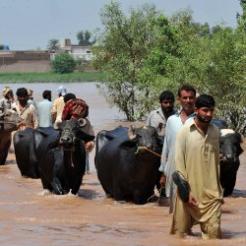The Department for International Development has announced the launch of a rapid response network of 32 UK-based charities and businesses which will have access to funding within the first crucial 72 hours of a natural disaster.
The unit combines the experience of a number of large organisations such as the British Red Cross and Christian Aid with the niche expertise of smaller organisations such as water-purifier Lifesaver Systems and solar-power specialists for the developing world ToughStuff.
A competitive tender process for the 'Disaster Response Fund (DRF)' was undertaken and approval of organisations will be an ongoing process.
Funding cut to umbrella organisation
However, while DfID celebrates the network as the first time the British government has brought together NGOs and private organisations for emergency relief, the new unit does not represent new funding, as funding for pilot organisation the Consortium of British Humanitarian Agencies which operates under the same remit was cut at the end of last year.
DfID says the new unit "does not direct funding away from the CBHA's emergency response funding (ERF) as there's no specific funding pot".
CBHA was set up in 2010 as a consortium of 15 NGOs with funding from DfID to provide emergency response funding and build capacity and skills for humanitarian workers around the world. In December 2011, told that its pilot funding would not be renewed by the Department, the Consortium, which is hosted by Save the Children, announced its intention to seek alternative income.
All but one of the CBHA member charities, most of which are also members of the Disasters Emergency Committee, have been approved by DfID as part of the new rapid response network. Plan UK, which also applied, has not been approved. A Plan spokesman said this was due to Plan's comparative lack of experience as part of the Disasters Emergency Committee. It is currently in the process of investing extensively in its internal disaster management procedures and the application came in the middle of this, he said. The charity will reapply soon.
But responding to today's announcement, CBHA director Sean Lowrie told civilsociety.co.uk that he fears that less high-profile disasters could suffer in the reallocation of funding directly through DfID.
"While this new DfID mechanism has adopted one positive feature from the CBHA emergency response funding (ERF) - 72-hour disbursements - it raises fundamental questions.
"First, it would appear to be designed for the high-profile mega-natural disasters like the Haiti earthquake or the Pakistan 2010 floods. Yet arguably there is greater aggregate need in smaller-scale isolated emergencies, or in events that do not reach the Western media headlines. In contrast, the CBHA makes decisions based on information obtained from frontline staff or local partner organisations.
"Second, the new mechanism appears to centralise decision-making about disbursements in the Secretary of State, an elected politician. Yet the Ashdown review highlighted the need for humanitarian response funding to be impartial - based on need alone.
"In contrast, the CBHA ERF uses a peer review process of decision-making to ensure that funding decisions were impartial. With civil society organisations making decisions about humanitarian response funding, the CBHA ERF has been designed to address the flaws in the current international system. Our funding is not allocated according to media headlines, commercial interest, or political priorities."
CBHA's future is now in the balance. Lowrie advised that all 15 of its current charity members have pledged funding for core costs from their own fundraising to come into force this year but added that it is now exploring a new business model to include funding from private and public institutions both in the UK and abroad.
Inclusion of private businesses
International Development Secretary Andrew Mitchell, who leads DfID and therefore the new network, welcomed the inclusion of private sector organisations in the new network. He said that the organisations approved by DfID "represent the very best-performing disaster response agencies" and that "they deliver value for money for British taxpayers".
"The private sector plays a vital role in emergency response and I am particularly encouraged that so many have already agreed to be involved in the Rapid Response Facility," he added.
Funding will be determined by DfID in response to specific emergencies, the Department advised, but would not offer a definitive figure for the emergency response pot.
Brendan Paddy, communications manager at the DEC said the new unit is not competing in any way with its services. "They don’t do public fundraising which is our main reason for existing so there’s not really any crossover at all," he said. "We were fully aware of what they were planning and are entirely supportive," he added.
Compliance
DfID warns that any organisation currently approved would have their pre-qualification revoked "at the first sign of poor performance".
"The new Rapid Response Facility can be activated by DfID in the event of a future large-scale humanitarian crisis," a spokesperson told civilsociety.co.uk. "Selected organisations will be approached within hours so we can take immediate action to deliver targeted aid to affected people."
Organisations signed up to the unit will be "expected" to respond, the Department adds.
The full list of organisations approved by DfID is:
|
ActionAgainst Hunger |
Islamic Relief |
|
ActionAid |
Guava International (Land Rover) |
|
AST |
Lifesaver Systems |
|
British Red Cross |
MapAction |
|
Butyl |
Mercy Corps Scotland |
|
Cafod |
Merlin |
|
Care International |
Mine AdvisoryGroup |
|
Castell Communications |
Shelterbox |
|
Christian Aid |
Osprey Plastics |
|
Concern |
Oxfam |
|
Evenproducts |
Pump International |
|
Goal |
Reltex |
|
Handicap International |
Save the Children |
|
HelpAge International |
Tearfund |
|
International Medical Corps |
Toughstuff |
|
International Rescue Committee |
World Vision |









